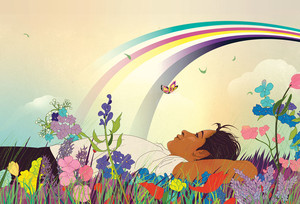“On May 20 of this year,” the British actor Paul Hecht tells the crowd inside the downstairs dinner theater at New York’s Cornelia Street Café, “the American Psychiatric Association launched its so-called bible of psychiatry, the newly revised edition of the Diagnostic and Statistical Manual of Mental Disorders. It is the first new edition of the DSM in nineteen years. It is one thousand pages long, and retails for $199.”
But who wants to schlep a doorstop?
Hecht explains that there is an alternative, and introduces the two men seated with him on the stage: Jay Neugeboren ’59CC and Michael Friedman ’64CC, ’70GSAS, coauthors of the Diagnostic Manual of Mishegas (DMOM), a Yiddish-inflected satire of the DSM that they wrote with Lloyd Sederer, the medical director of the New York State Office of Mental Health. (Mishegas — pronounced mish-a-goss — is Yiddish for craziness.) Neugeboren, a writer and novelist, and Friedman, the former deputy commissioner of the New York State Office of Mental Health, are here on this midsummer night to treat the audience to — or is it with? — a spiel based on their slender volume.
The DMOM has a similar cover to the DSM, but at sixty-two pages is in all ways lighter than the original. The idea for the book came in February, when Neugeboren, Friedman, and Sederer, who are all adjunct professors at Columbia, got together for drinks and began discussing the controversies over the latest version of the DSM (among them: should bereavement be classified under depression?).
“People have gotten themselves into deep tumult about diagnoses,” Neugeboren explains. “‘It should be called this and it shouldn’t be called that,’ and some of it is absurd.” Neugeboren became familiar with mental-health issues through taking care of his mentally ill brother, the inspiration for his 2003 book Imagining Robert.
As the friends schmoozed, Friedman declared that there were “really only two mental disorders — mishegas major and mishegas minor.” And so they began to contemplate the capacity of Yiddish, a language with an almost onomatopoetic relationship to anguish and deprecation, to bring clarity to the linguistic complexity of psychiatric diagnoses. This led to the idea of a Yiddish diagnostic manual. Neugeboren got to work, eager to get the book out in May, around the same time that the revised DSM was to be published.
He churned out a draft in four weeks, and his collaborators then “potchkied with it,” Neugeboren says, “potchkied being Yiddish for played around with.” The final product is like the love child of the DSM and Leo Rosten’s The Joys of Yiddish.
To promote the book, the friends organized the Cornelia Street Café event.
With Hecht and Friedman onstage and Sederer in the audience, Neugeboren opens the scripted performance by reading straight from the DSM: “Subtypes (some of which are coded in the fifth digit) and specifiers are provided for increased specificity. Subtypes define mutually exclusive and jointly exhaustive phenomenological subgroupings within a diagnosis.”
“You had to write a satire?” someone shouts.
There are laughs throughout the night, occasionally mixed with groans and winces at the often-corny Jewish jokes for which Neugeboren, Hecht says, has “an encyclopedic memory.” At one point, Hecht comments, “I can’t believe these jokes are still getting laughs.” An onstage pianist, Ellen Mandel, punctuates the punch lines with piano flourishes. Then she reads aloud some of the female conditions, such as the symptoms of a yenta.
Yenta is a term many New Yorkers are familiar with — the gossip, the meddler — while others are more obscure, like schmegegge. “Your brother-in-law usually qualifies as the schmegegge,” says Neugeboren. “Or, if he’s the successful one, it’s you who are the schmegegge.”
The listeners at Cornelia Street rarely need definitions, though. Their Yiddish is sharp, and when Friedman mispronounces alter kocker (“If we live long enough, we all become forgetful alter kockers”), they’re quick to correct him, with some particularly impassioned audience members calling out, “Oy vey!” and “You don’t deserve the name Friedman!”
By night’s end, two dozen copies of the DMOM have sold. The book is also a hit with DSM’s publisher, the American Psychiatric Association, whose psychiatric professionals don’t seem to feel mocked, as the authors had feared they might.
“Because of all the mishegas going on in the field and all of these vituperative exchanges and communications by critics, levity was welcome,” says Sederer. “A lot of people who bought this are the people who wrote the DSM, so it turned out to be a tonic.”
But what about a tonic for mishegas itself?
The DMOM authors write, “For virtually all cockamamy conditions of character, the operative diagnosis is gornisht helfen” — beyond help — “though it can’t hurt to try matzoh ball soup, a spa day, a sitz bath, a cruise in the Bahamas, or playing hooky from work in the afternoon and going to a movie and not telling anyone.”


